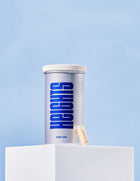
Deep dive: How B12 impacts your microbiome
We look at how vitamin B12 is related to the microbiome and why this is so important to understand.

The microbiome is beneficially supported by a range of vitamins in the diet. These include vitamin A , B2 , D and E and they are able to increase the abundance of bacteria present. However, not mentioned here is vitamin B12 , which is an essential vitamin for humans, as we cannot produce it inside the body. Instead, we must acquire it from our diet. Recently, compelling research has demonstrated a strong link between B12 and the microbiome working together.
In this article, we’ll look into what B12 is, what it does, how we use it, and the relationship between B12 and the microbiome.
What is B12 and where does it come from?
Vitamin B12 is the generic term used to describe a group of physiologically active substances. They are one of the most structurally complex molecules produced in nature. Due to their complexity, only a select few bacteria are able to produce the micronutrient. Testament to the importance of B12 for our gut, it is estimated that 80% of our gut bacteria require B12 for their own metabolic purposes. Only a select few bacteria are able to synthesise this macronutrient and these are only present in particular environments, most notably in the guts of cattle and sheep.
What is the benefit of B12?
B12 is an essential vitamin, important for:
-
Balancing mood
-
Supporting hair, skin and bone health
-
Combatting fatigue
-
Strengthening the immune system
-
Enhancing sleep
-
Reducing brain fog and confusion
How much do we need?
Adults (aged 19 to 64) require 1.5 micrograms of vitamin B12 per day.
Although the recommended daily intakes are the lowest of any micronutrient, B12 deficiency is still prevalent in some populations—notably those over 60, those following vegetarian or vegan diets, and individuals unable to absorb B12 due to certain diseases.
However, for those that can, the body stores excess B12 in the liver as a reserve. As a water-soluble vitamin, there is low potential for toxicity if taken in very high doses as excess is readily removed in the urine.
How can humans acquire it?
Humans acquire B12 in its most bioavailable form from dairy produce. Similarly, in aquatic systems, B12 makes its way into our diets via fish and shellfish alike (originally from phytoplankton).
Nevertheless, fermented food such as tempeh or kimchi as well as algae, spirulina, and certain mushrooms are suitable alternatives for those who avoid dairy and/or meat produce, or who suffer from dairy-related intolerances.
How is vitamin B12 absorbed by the body?
Vitamin B12 is exclusively absorbed towards the end of the small intestine. Within a healthy and strong gut, B12 is eventually released and transported across the cell membrane into the blood circulation, capable of reaching every cell in the body, including those in the brain.
It is not only essential that our gut microbiome is healthy and functioning optimally to ensure successful absorption of B12 into the bloodstream, but it is also understood that the presence of B12 has microbiome enhancing properties. This includes diversifying our microbial community, increasing the abundance of bacteria found in our guts, and the production of short-chain fatty acids. These are important for both our gut, immune and brain health. This new evidence serves to demonstrate how a healthy, active, and diverse gut microbiome is essential for the absorption of B12.
What is the benefit of a healthy microbiome?
Our gut microbiome is an entire ecosystem that impacts every part of your body. It consists of 500 species, 2 million genes, and 400 trillion microbes working together.
Our gut microbiome is initially shaped by microbes in breast milk and our environment until it stabilises by around the time we are three years old. However, our environment, diet, lifestyle and medications that we take, such as antibiotics, continue to play a role as we age, meaning our microbiome can change throughout our life. Day to day, our diet is responsible for the bacteria present within our microbiome and if we regularly eat many different foods, our microbiome naturally diversifies. Taking a quality probiotic can help to ensure that your microbiome remains diverse and healthy.
A healthy and diverse microbiome aids in:
-
Digestion
-
Reducing bloating
-
Increasing energy
-
Supporting immune health
-
Supporting our mood
A thriving microbiome supports your whole body’s well-being from within.
So what does this all mean?
Simply, without a healthy microbiome, essential nutrients such as B12 may not be displaying the benefits within our body that they have to offer. A healthy microbiome is related to the bacteria present within the gut.
If we take the following assertions about vitamin B12, it allows us to see why it’s important, and how to ensure we continue to get enough:
-
B12 is an essential nutrient required for humans, however it can’t be obtained from diets that do not include animal produce in a satisfactory quantity every day.
-
B12 is absorbed exclusively within the small intestine, where we rely on a healthy microbiome to absorb maximum B12 into our bloodstream.
-
B12 is key to maintaining a healthy, diverse community of bacteria within the microbiome, which is important for maintaining both mental and immune health.
Taking care of your gut is strongly related to your diet and vitamin intake. As we are aware that B12 is not found in all diets, more than ever, we must consider our overall health to be more than simply ‘eating well’ as we may understand it. The great news is that at the moment, you can request to have vitamin B12 levels tested by your GP in the United Kingdom. If you know your diet is low in B12, or have had blood results to demonstrate this, it would be advised to consider adding a high quality supplement offering generous B12 into your daily routine.
Gut health and the microbiome are essential for every part of your well-being, including your brain, gut, immune, and mental health. Find out how .
Know your own mind?
The average brain health score is 51/100. Take our 3-minute quiz to learn how yours measures up and how to boost it.


















